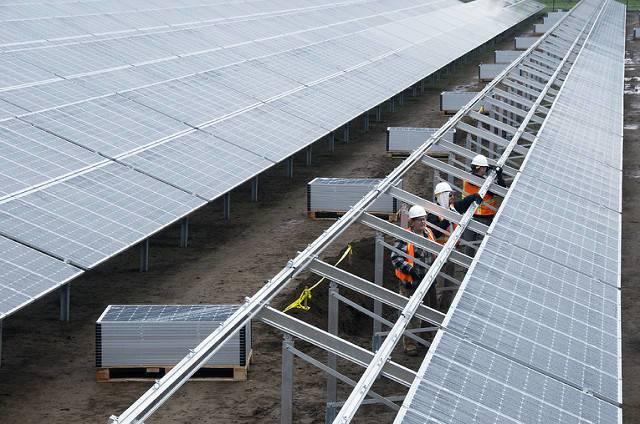
If there is any one recurrent challenge that President Donald Trump faces these days when it comes to safeguarding U.S. trade rights, it is ensuring that U.S. companies aren't caught in the fray.
The looming debate with China over solar parts production is a good example.
Earlier this month the 4-member U.S. International Trade Commission unanimously decided that the "increased imports of crystalline silicon photovoltaic cells [is] a substantial cause of serious injury to the domestic [solar] industry. " The finding was in response to a complaint by Suniva and SolarWorld, two solar parts manufacturers that have run into financial troubles in recent years. The complaint, which includes a petition for relief, pinned their troubles on the import of solar parts and panels from international sources, which they said "have unexpectedly exploded," and that as a result, "prices have collapsed."
The ITC's investigation wasn't country specific, meaning its job in this case is only to determine whether international imports and the way they are being imported is harming domestic industries. But for those who have been following this story, there is little doubt that it has been China's prolific and aggressive efforts to penetrate U.S. solar markets that prompted the ITO finding.
In 2014, the World Trade Organization accused the U.S. of applying countervailing duties on some Chinese products in response to China's alleged subsidy of companies that exported solar parts to foreign markets like the U.S. According to the WTO, the U.S. was violating global trade rules when it imposed modest tariffs against Chinese firms.
That dispute was never put to bed. In fact, the trade dispute between U.S. and China may be one of the few holdovers of the Obama era that the Trump administration is willing to get behind. Earlier this year, Trump declared his support for imposing tariffs against foreign importers accused of inundating the U.S. market.
Home solar: The industry that international trade built
But just for the sake of argument, what if the U.S. solar industry were actually benefiting from Chinese companies' expertise? What if China's sizable manufacturing industry were actually helping to keep the U.S. solar installation market in the black, with the ready supply of solar cells, parts and fast-paced turnaround?
What's interesting about the ITC finding is the response from the solar community, which has largely come out against the decision. According to the Solar Energy Industries Association (SEIA), Chinese manufacturing capability actually fills a niche that U.S. markets have been unable in the past to master.
"In the utility segment, the petitioners (Suniva) were unable to manufacture and supply 72-cell modules required to meet demand,” stated SEIA in August. " Therefore, to meet utility-scale demand, increasing CSPV imports were pulled into the U.S. utility market — they did not “flood” the market ..."
Nor did China infiltrate the U.S. market, points out BBC writer Chris Baraniuk. Its segue into the U.S. market actually happened some 10 years ago at the hands of American innovators like Geof Moser, who saw potential to fill a need he knew U.S. companies weren't matching.
But all the debates over whether Chinese imports unfairly imbalanced the market is water under the bridge at this point. Now the question is what the ITC decision will mean to the U.S. solar industry that relies on those resources.
Under ITC rules, the issue now heads to Trump, who has already said he supports tariffs. Trump's decision to impose a 219 percent trade levy against Canadian producer Bombardier in an escalating trade war involving Boeing and the Canadian manufacturer this week underscores the solar industry's nervousness about Trump's view of tariffs. For some, it's a "doomsday scenario" that would gut the U.S. energetic home solar industry by strangling the flow of parts critically needed for production and installation.
And Trump's preference for tariffs in this case might help other industries as well -- industries that have suffered for years under the growing shadow of renewable energy. A flagging solar industry could mean more opportunities for carbon-based energy, something his administration has openly supported and the world is working to decrease.
But it may be too soon to know whether the ITC's decision will really herald the end of a U.S. solar boom. Some experts have pointed out that Trump's own political woes and declining popularity may also influence his decisions in this matter. The prospect of having a trade war with China (as well as increasing disputes with Canada, Mexico and the UK, another Bombardier industry benefactor) may not be something Trump will want to start any time soon.
For those who have insisted that foreign manufacturers are elbowing out domestic producers, the opportunity for stepping up and filling that niche may soon arrive. The question is, will they be there when the installation market needs real volume?
Image:Flickr/Oregon Department of Transportation
Jan Lee is a former news editor and award-winning editorial writer whose non-fiction and fiction have been published in the U.S., Canada, Mexico, the U.K. and Australia. Her articles and posts can be found on TriplePundit, JustMeans, and her blog, The Multicultural Jew, as well as other publications. She currently splits her residence between the city of Vancouver, British Columbia and the rural farmlands of Idaho.














